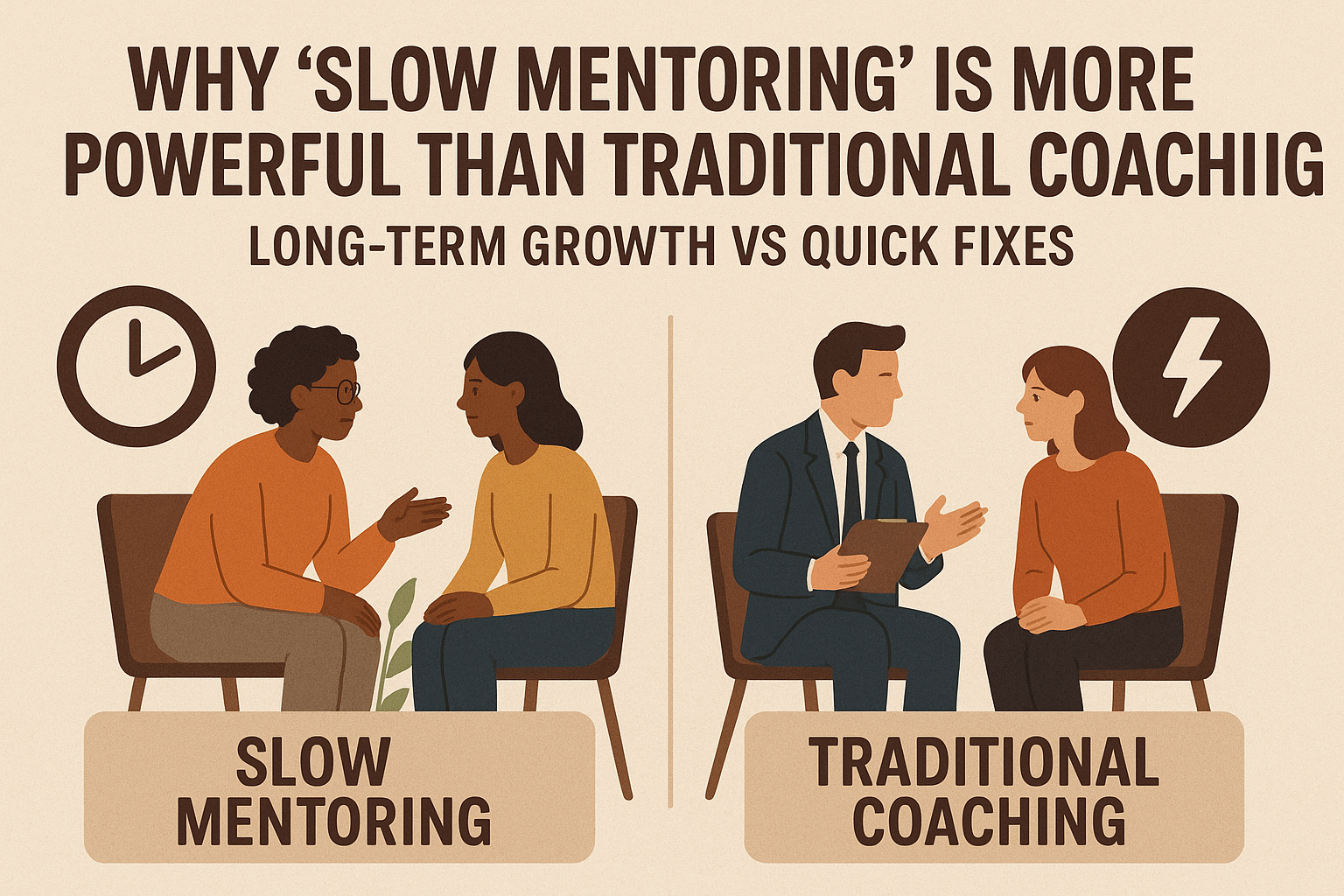Why “Slow Mentoring” Is More Powerful Than Traditional Coaching — Long-Term Growth vs Quick Fixes
Introduction
In a culture craving instant gratification and rapid results, it is somewhat of a radical concept to embrace "slow mentoring"—which is about developing sincere, deep-rooted relationships that foster intentional and meaningful growth through patience. Slow mentoring is not about optimizing productivity or building short-term motivation; on the contrary, it is the means by which people and managers can invest in developing talent over time in an organic way. In an organizational context, slow mentoring is not solely about fixing the issue at hand; rather, slow mentoring is about gradually evolving the person over time. It is the type of guidance that creates not just what we do—rather, it evolves who we become.

The Beauty of Slow Mentoring: Time to Grow
Slow mentoring emphasizes the beauty of moving at a slower pace. It’s less about organized encounters and more about the informal conversations we have together, shared moments, and genuine interest. While so much of society is structured and rushed for completion, slow mentoring provocatively asks you to slow down – not only to find out what you should do, but why it matters. Relationships often formed in this way grow and evolve over time. Slow mentoring isn’t simply checking off goals or preparing for immediate engagement to enact some kind of change; slow mentoring is more about building perspective, resilience, and emotional capacity. The fundamental issue of slow mentoring is really about consistency, which includes those minuscule check-ins, reflections and narratives, which shapes how we think and act. Over months or more years slow mentoring builds something deeper than results – it builds wisdom. True growth that sticks, doesn’t come in a sprint; it comes over time, with someone we trust, in time, with all of our shared humanity.
Depth Over Speed: Cultivating True Wisdom, not Skills
Despite traditional coaching often emphasizes quantifiable outcomes – whether the goal is a skill or competency learned, improved performance, or a behavioral change. Slow mentoring, however, has a different trajectory. It is less an emphasis on achieving measurable goals, and more an emphasis on the ‘why’ behind the behavior. Slow mentoring focuses less on efficacy, and more on reflection, self-awareness, and wisdom. Through slow mentoring conversations, mentors prompt and support their mentees in learning their own thinking and behavioral patterns, build emotional intelligence, and cultivate clarity in responding to complexity. This is not something that can occur fastest, as both friendships and trees shift over time. Each conversation adds another ring of insight. With time, the mentee is no longer just becoming better at their job, but grounded, flexible, and thoughtful individuals. This is the subtle power of slow mentoring: It develops depth, and allows for growth, in ways that no quick coaching, crash course, or seminar could.

The Significance of Trust and Vulnerability in Authentic Mentorship
At the center of every authentic mentorship rests trust — the sort that permits two individuals to be sincere to one another. With slower mentoring, the situation does not include artifice or performance, as both the mentor and mentee appear as they are, sharing their doubts and failures, and the lessons learned the hard way. This honesty creates an opportunity for directly engaged conversations — often absent in the fast-paced environment of coaching. Vulnerability becomes a bridge for sharing experiences and building shared respect, until the mentee has enough trust to be able to share fears or mistakes, and the mentor becomes more than simply an adviser, becoming a mirror for growth. Trust like this does not happen overnight, but takes time, often requiring weighty evidence of presence, and the premise of authenticity. And when that trust is realized, it changes the nature of mentorship from a professional way to engage, to a human relationship that encourages sincere and meaningful transformation.
Sustainable Success: Long-Term Mentoring Beats Quick Solutions
While fast coaching sets you up to win today, slow mentoring sets you up for enduring success. The difference is how long the lessons linger in your mind. Quick coaching usually focuses on strategies or smaller adjustments. Slow mentoring embeds way of thinking and your belief in. It takes you through real-world situations — not simulated ones, that you find the connections between lived experience and growth. Slow mentoring is that long-term support systems help you create a new normal once the sessions end. You become proficient in responding to unexpected bumps with grit and acting, or not acting, in ways that represent who you are. It is not attachment, but rather growing into your own independence, where the mentor slowly helps you find your footing on your own. Once more, slow mentoring is not just the fast fix, but discoveries along the way to mastery and self-awareness that remains long after the mentoring relationship restarts and evolves.
Conclusion
Slow mentoring is a reminder that genuine growth can’t be rushed. It’s simply being there for another individual, listening to what they are saying, and learning together through relationships. Although quick coaching can promote movement, slow mentoring shapes principles, character, and wisdom that not only last, but also build to culminate into your faster coaching. Ultimately, it is the slow mentoring that transforms potential into purposeful activity — slowly and quietly, but with a greater impact.
